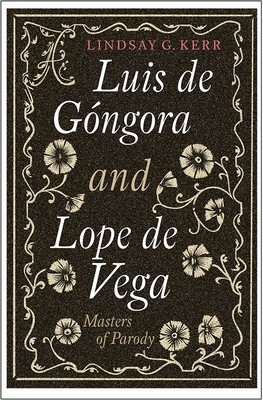
- We will send in 10–14 business days.
- Author: Lindsay G Kerr
- Publisher: Tamesis Books
- ISBN-10: 1855663171
- ISBN-13: 9781855663176
- Format: 15.6 x 23.4 x 1.4 cm, kieti viršeliai
- Language: English
- SAVE -10% with code: EXTRA
Reviews
Description
Traces the processes and paradoxes at work in the late parodic poetry of Luis de Góngora and Lope de Vega, illuminating correlations and connections.
Co-Winner of the 2014 Publication Prize awarded by the Association of Hispanists of Great Britain and Ireland Kerr traces the processes and paradoxes at work in the late parodic poetry of Luis de Góngora and Lope de Vega, illuminating the correlations and connections between two poets who have more often than not been presented as enemies.The analysis follows the parallel development of the complex parodic genre through Góngora's late mythological parody, from his 1589 Hero and Leander romance through to his culminating parody, La fábula de PÃramo y Tisbe (1618) and Lope de Vega's alter ego Tomé de Burguillos, whose anthology, Rimas humanas y divinas del licenciado Tomé de Burguillos, was published a year before Lope's death, in 1634. Working from the premise that parody provides a Derridean supplément to exhausted, dominant genres (e.g. pastoral, lyric, epic), this study asks: what do these texts achieve by their supplementarity, and how do they achieve it?, and, the overarching question, why do these erudite poets turn to parody in an age of decline? Lindsay Kerr received her PhDin Spanish at Queen's University Belfast.EXTRA 10 % discount with code: EXTRA
The promotion ends in 23d.14:16:41
The discount code is valid when purchasing from 10 €. Discounts do not stack.
- Author: Lindsay G Kerr
- Publisher: Tamesis Books
- ISBN-10: 1855663171
- ISBN-13: 9781855663176
- Format: 15.6 x 23.4 x 1.4 cm, kieti viršeliai
- Language: English English
Traces the processes and paradoxes at work in the late parodic poetry of Luis de Góngora and Lope de Vega, illuminating correlations and connections.
Co-Winner of the 2014 Publication Prize awarded by the Association of Hispanists of Great Britain and Ireland Kerr traces the processes and paradoxes at work in the late parodic poetry of Luis de Góngora and Lope de Vega, illuminating the correlations and connections between two poets who have more often than not been presented as enemies.The analysis follows the parallel development of the complex parodic genre through Góngora's late mythological parody, from his 1589 Hero and Leander romance through to his culminating parody, La fábula de PÃramo y Tisbe (1618) and Lope de Vega's alter ego Tomé de Burguillos, whose anthology, Rimas humanas y divinas del licenciado Tomé de Burguillos, was published a year before Lope's death, in 1634. Working from the premise that parody provides a Derridean supplément to exhausted, dominant genres (e.g. pastoral, lyric, epic), this study asks: what do these texts achieve by their supplementarity, and how do they achieve it?, and, the overarching question, why do these erudite poets turn to parody in an age of decline? Lindsay Kerr received her PhDin Spanish at Queen's University Belfast.

Reviews